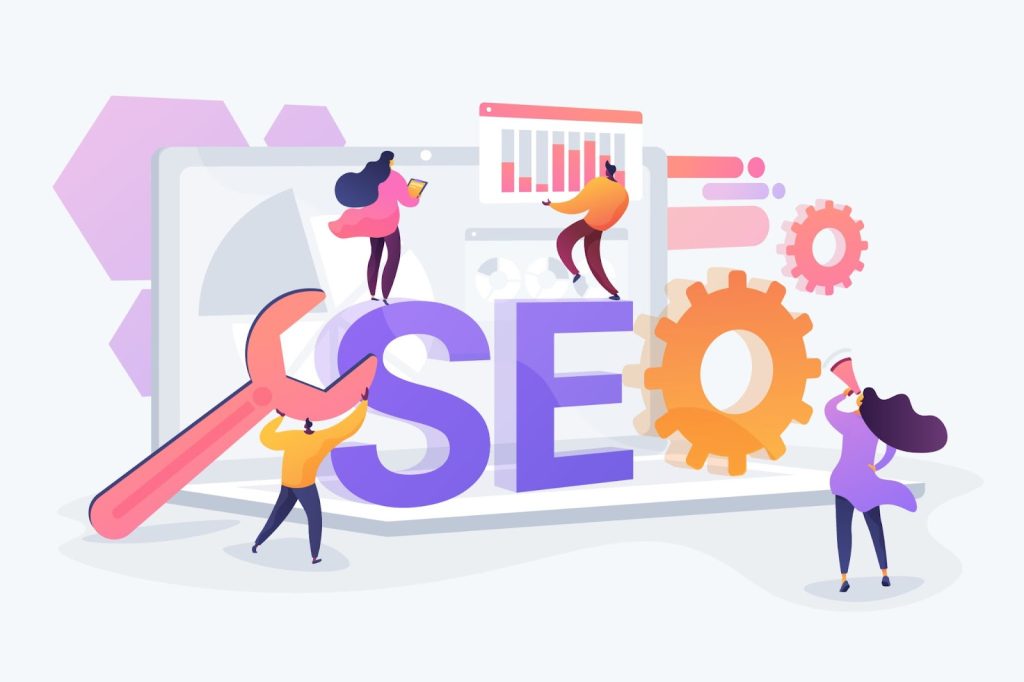Search engine optimization (SEO) drives online visibility, making it one of the most powerful digital marketing strategies for businesses of all sizes.
Without SEO, even the most well-designed website may struggle to attract visitors, losing potential customers to competitors with stronger search rankings. SEO ensures search engines can easily find, index, and rank your content, helping your website appear at the top of search results when users look for relevant products, services, or information.
SEO goes beyond ranking — it builds credibility, improves user experience, and generates sustainable traffic. When you optimize your website with relevant keywords, high-quality content, and a seamless structure, you enhance its ability to meet search engine criteria while delivering value to users.
Unlike paid advertising, which requires continuous spending, SEO provides long-term benefits by steadily increasing organic traffic over time.
Businesses that invest in SEO gain a competitive advantage by reaching their target audience at the right moment. Whether through technical improvements, content optimization, or link-building strategies, SEO enhances website performance and maximizes conversions.
In this blog, we’ll explore how SEO can transform your website, drive engagement, and elevate your brand’s online presence.
Table of Contents
ToggleIncrease organic traffic with SEO
Search engine optimization increases organic traffic by improving a website’s ranking on search engine results pages (SERPs). When users search for products, services, or information, high-ranking pages gain greater visibility, leading to more clicks and engagement. Unlike paid advertising, organic traffic grows over time and provides lasting value without ongoing ad spend.
Businesses must strategically optimize their content with well-researched keywords to achieve strong rankings. Search engines analyze keyword relevance, so integrating natural, contextually appropriate keywords within high-quality content helps attract the right audience.
However, keyword stuffing negatively impacts rankings, so SEO best practices prioritize readability and user value.
Beyond keywords, website structure and usability significantly influence search rankings. Search engines favor fast-loading, mobile-friendly sites with easy navigation. A well-structured website improves user experience, encourages visitors to explore more pages, and reduces bounce rates — factors that signal credibility and relevance to search algorithms.
Content quality remains a key driver of organic traffic. Websites that consistently publish informative, engaging, and original content establish authority and trust with both users and search engines. Blog posts, industry insights, and multimedia elements like images and videos enhance engagement, increasing time spent on-site and improving ranking potential.
Additionally, SEO strengthens domain authority through backlinks from reputable sources. Earning links from high-quality websites boosts credibility and enhances search engine trust. Businesses can encourage backlinks by producing shareable content, guest posting on industry blogs, and building relationships with influencers.
Regular content updates keep a website fresh and relevant. Search engines prioritize sites that frequently publish new insights, case studies, and newsworthy updates. By refining SEO strategies and continuously optimizing site performance, businesses can sustain long-term organic traffic growth and stay competitive in an evolving digital landscape.

Enhance user experience with SEO
A well-optimized website delivers a seamless user experience, keeping visitors engaged and increasing conversions. Search engine optimization plays a crucial role in structuring a site for easy navigation, fast load times, and mobile responsiveness. Search engines prioritize websites that enhance user satisfaction, which leads to higher rankings and better retention.
Website speed significantly impacts user engagement. Slow pages frustrate visitors, leading them to leave before exploring further. Compressing images, minimizing code, and leveraging browser caching improve load times, ensuring users get the information they need without delay.
Mobile-friendliness is essential as more users browse on smartphones and tablets. A responsive design automatically adjusts content to fit different screen sizes, maintaining readability and usability. Google rewards mobile-optimized sites with higher search rankings, making this a non-negotiable aspect of SEO.
Intuitive navigation allows users to find what they need with minimal effort. A well-organized menu, clear headings, and logical page hierarchy guide visitors smoothly through your site. Implementing internal linking directs users to relevant content, keeping them engaged longer and reducing bounce rates.
Structured content improves readability, making information easily digestible. Breaking text into short paragraphs, using subheadings, and incorporating bullet points help users quickly absorb key details. Visual elements like images, videos, and infographics add variety, making content more compelling.
A positive user experience not only retains visitors but also strengthens brand credibility. Search engines recognize user behavior signals, such as time on site and interaction levels, when determining rankings. By optimizing for speed, mobile usability, and clear navigation, businesses enhance both user satisfaction and SEO performance, driving long-term success.
Higher credibility and trust
Ranking on the first page of Google significantly boosts your website’s credibility. Users inherently trust search engines to deliver the most authoritative results, and sites appearing at the top gain immediate legitimacy.
Studies show that the majority of users click on the first few search results, rarely venturing past the first page. If your site ranks highly, visitors perceive it as more reputable and reliable.
Backlinks from trusted sources further solidify your authority. When respected websites link to your content, search engines interpret this as a vote of confidence, improving your domain authority and boosting rankings. Businesses that earn backlinks through high-quality content, guest posts, and industry recognition establish themselves as leaders in their niche.
Google’s E-E-A-T principles (Experience, Expertise, Authoritativeness, Trustworthiness) play a crucial role in SEO success. Google prioritizes content that demonstrates firsthand experience, deep subject knowledge, and credibility from established sources.
Websites that publish well-researched, expert-driven content gain higher rankings and increased trust from both search engines and users.
Earning trust extends beyond search rankings — it also enhances user engagement and conversions. Visitors are more likely to interact with brands they perceive as authoritative, whether by subscribing to a newsletter, making a purchase, or sharing content.
A business that consistently publishes valuable, informative content while earning credible backlinks positions itself as a trusted industry leader.
Cost-effective marketing strategy
SEO offers a cost-effective marketing strategy that delivers long-term value without the recurring costs of paid advertising. Unlike PPC campaigns that require continuous spending, SEO builds organic traffic that sustains itself over time. Businesses that invest in SEO create a foundation for ongoing visibility, reducing reliance on expensive ad budgets.
Websites that rank well on search engine results pages (SERPs) attract steady traffic without paying for every click. High-quality content, optimized keywords, and strong backlinks keep a website competitive, ensuring long-term exposure.
While PPC delivers immediate results, its effectiveness ends when the budget runs out. In contrast, SEO continues generating traffic even without constant financial investment.
Businesses can maintain high rankings with minimal spending by updating content, optimizing technical elements, and earning authoritative backlinks. Regular SEO audits help refine strategies, ensuring sustained visibility.
By focusing on organic growth, businesses enhance brand recognition, improve trust, and drive consistent traffic, making SEO one of the most cost-efficient marketing strategies available.

Competitive advantage in your industry
Businesses that invest in strong SEO consistently outperform competitors by capturing more organic traffic and establishing authority in their industry. Ranking higher on search engine results pages (SERPs) ensures greater visibility, attracting more potential customers before they even consider competitors. A well-optimized website signals credibility, making it easier to build trust and increase conversion rates.
Local SEO gives businesses a powerful advantage in their geographic market. By optimizing for location-specific keywords, claiming Google Business Profile listings, and gathering positive reviews, businesses can dominate local search results.
This strategy helps brick-and-mortar stores, service providers, and regional brands attract nearby customers actively searching for their offerings.
SEO also allows businesses to compete with larger brands by targeting niche markets. Long-tail keywords, high-quality content, and strategic backlinking enable smaller businesses to rank for specific searches that bigger competitors may overlook. A well-executed SEO strategy ensures continuous growth, positioning a business as the go-to option within its industry.
Staying ahead in competitive markets requires ongoing SEO efforts. Regularly updating content, optimizing for emerging trends, and leveraging data analytics ensure businesses maintain their ranking. Those who consistently refine their SEO strategies gain a sustainable competitive edge, securing long-term success while competitors struggle to keep up.
Better conversion rates
An effective SEO strategy attracts visitors who are actively searching for solutions, increasing the chances of conversions. By optimizing content with high-intent keywords, businesses ensure they reach users ready to take action. When website pages align with search intent, visitors engage more deeply, leading to higher conversion rates.
SEO guides users through the sales funnel by providing relevant content at each stage of their journey. Informational blog posts attract users in the awareness stage, while in-depth guides, case studies, and product comparisons nurture prospects in the consideration phase.
As users move toward a decision, well-placed calls-to-action (CTAs) and optimized landing pages encourage them to complete a purchase, sign up, or request more information.
Well-structured landing pages and CTAs significantly improve conversions. Businesses can increase engagement by A/B testing different headlines, button placements, and messaging. Clear, action-driven CTAs — such as “Get a Free Quote” or “Start Your Trial”—help guide users toward immediate action.
Mobile-friendly, fast-loading pages with concise messaging further enhance user experience and conversion rates.
Long-term growth and sustainability
SEO fuels long-term business growth by establishing a sustainable online presence.
When businesses consistently optimize their content, improve technical performance, and enhance user experience, they create a self-sustaining system that continues to attract potential customers.
Regular content updates keep websites relevant. Search engines prioritize fresh, high-quality content that aligns with evolving user intent. Businesses that consistently refine blog posts, update service pages, and add industry insights signal to search engines that their site remains authoritative and valuable.
This ongoing effort helps maintain and improve rankings, preventing competitors from overtaking search positions.
Adapting to algorithm updates ensures sustained SEO success. Search engines evolve constantly, incorporating AI-driven results, voice search optimization, and new ranking factors.
Businesses that monitor these changes and adjust their strategies stay ahead of industry shifts. Whether optimizing for featured snippets, improving mobile responsiveness, or leveraging structured data, proactive SEO efforts ensure long-term visibility.
Continuous improvements strengthen rankings and credibility. Regular site audits identify gaps such as slow page speeds, broken links, or outdated content. Fixing these issues enhances user experience and builds trust with both visitors and search engines.
Additionally, securing high-quality backlinks and refining internal linking strategies further establish authority and boost search engine rankings.

Measurable results and insights
SEO provides businesses with measurable results, helping them refine strategies based on real-time data. Unlike traditional marketing, SEO offers precise insights into website traffic, user engagement, and conversion rates, ensuring every optimization effort contributes to growth.
Marketers rely on tools like Google Analytics, Google Search Console, and SEMrush to track performance. These platforms reveal traffic sources, keyword rankings, and visitor behavior, helping businesses understand how users find their sites. By analyzing trends, companies can adjust content, improve user experience, and enhance search visibility.
Key performance indicators (KPIs) such as bounce rate, session duration, and click-through rate (CTR) provide valuable insights into website performance. A high bounce rate often signals slow load times, irrelevant content, or a poor user experience, prompting businesses to optimize page speed and refine their messaging. Session duration measures how long visitors stay on a site, indicating content engagement levels.
A strong CTR reflects compelling meta descriptions and headlines that attract clicks. Businesses that track and adjust these metrics continuously improve user retention, engagement, and overall website effectiveness.
Conversion tracking measures SEO’s direct impact on business goals. Google Analytics allows businesses to set up conversion tracking for actions like purchases, form submissions, or newsletter signups. If a high-traffic page generates minimal conversions, marketers can tweak CTAs, restructure content, or refine keyword strategies to better align with user intent.
SEO is not a one-time effort — it requires ongoing analysis and refinement. Search engine algorithms evolve, user behaviors shift, and competitors continuously optimize their sites. Businesses must stay agile by monitoring industry trends, testing new strategies, and leveraging real-time insights to maintain their competitive edge.
By leveraging data-driven SEO strategies, businesses maximize their digital marketing impact. Analyzing metrics, optimizing content, and adapting to changes ensure consistent growth, better search rankings, and increased customer engagement.
Revity Marketing Agency is your SEO expert
SEO remains one of the most effective digital marketing strategies for increasing organic traffic, improving user experience, and building brand credibility. A strong SEO foundation helps businesses attract high-intent visitors, convert leads, and sustain long-term growth by adapting to search engine algorithms. However, mastering SEO requires expertise, strategy, and ongoing optimization.
Revity Marketing Agency delivers data-driven SEO solutions designed to align with your business goals and maximize online visibility. Our expert team fine-tunes search engine strategies, enhances content optimization, and improves technical SEO to drive measurable results.
We conduct in-depth keyword research, optimize site structure, and implement performance-driven tactics to boost rankings and increase organic traffic. Whether you need local SEO, e-commerce optimization, or enterprise-level strategies, we craft solutions that ensure long-term success.
Partner with us to dominate search rankings and outshine the competition. Contact Revity today to elevate your digital presence!





